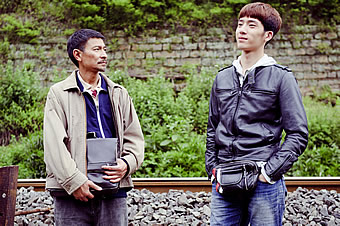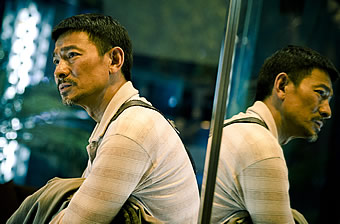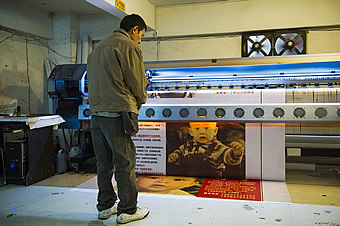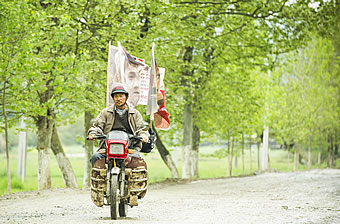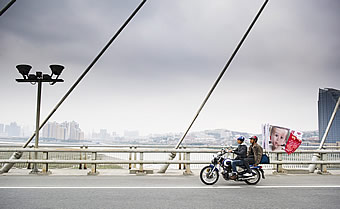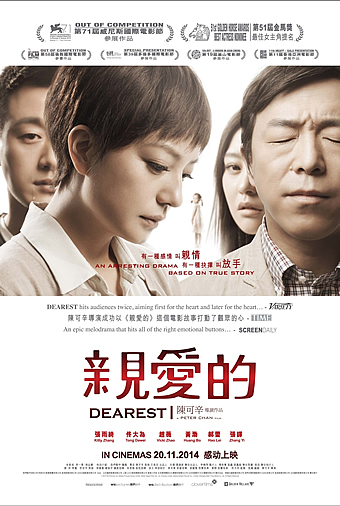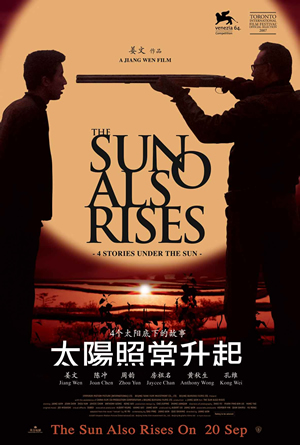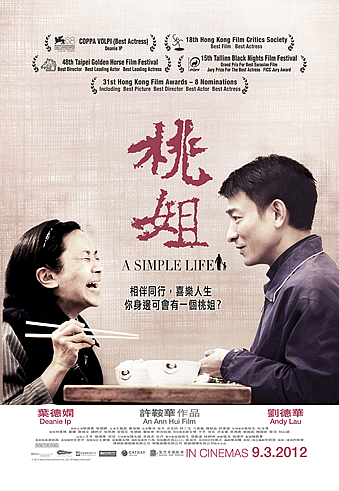LOST AND LOVE (失孤) (2015)
Genre: Drama
Director: Peng Sanyuan
Cast: Andy Lau, Jing Boran, Tony Leung, Sandra Ng
Runtime: 1 hr 49 mins
Rating: PG
Released By: Shaw
Official Website:
Opening Day: 26 March 2015
Synopsis: After losing his two-year-old son, Lei (Andy Lau) begins a fourteen-year-long quest in search of his missing child. Hanging off the side of his motorcycle is his most valued token, the last picture he ever took of his son, which has been circulating on the microblogging community. On the road, he makes a stop at a repair shop where he comes across a young repairman, Zeng (Jing Boran), who was also kidnapped at the age of four. Robbed of the life he was meant to live, Zeng can only vaguely remember snippets of home – a chain-link bridge, bamboo trees, and his mother’s long braids. Impassioned, Lei posts Zeng’s story and information online. Agreeing to help each other’s cause, Lei accompanies Zeng to Chongqing to try to find his home, developing a fatherly relationship along the way.
Movie Review:
A series of interconnected stories attempt to shed different perspectives on China’s child trafficking phenomenon in novelist-turned-filmmaker Peng Sanyuan’s ‘Lost and Love’, the second film in six months (after Peter Chan’s ‘Dearest’) based on the pressing social matter. On one hand, there is Andy Lau’s Lei Zekuan, an Anhui farmer who has been on the road on his motorcycle for the past 14 years in search of his lost son, whose picture as a kid is prominently displayed on a banner attached to the back of his vehicle. On another, there is Jing Boran’s mechanic Zeng Shuai, who was abducted as a child along with another boy from the same village and has been searching for his birth family since.
Besides Lau and Boran, there is also Ni Jingyang’s grief-stricken mother, whose 18-month-old infant was recently abducted at a busy traffic intersection. Besides handing out flyers to pedestrians, she spends her time hanging around the same intersection hoping to get a glimpse of her daughter. Interestingly, Jingyang’s character isn’t given a name, but there is no doubt she is intended to represent the shock and anguish of countless parents in the days and weeks immediately after their children’s disappearance. And to a much smaller extent, Sandra Ng plays her daughter’s kidnapper, driven by money to partake in such a heinous trade.
As well-intentioned as the multi-character narrative may be, it is quite blatantly clear just where Peng, who wrote and directed the movie, has her eye on. Indeed, despite opening with a ripped-from-the-headlines story of the abduction of Zhou Tianyu, that arc involving her mother and her kidnapper never quite goes anywhere – whether on its own or in the larger context– so much so that it winds up being an unnecessary distraction that comes literally to its own watery end. Unsurprisingly, Peng spends most of the screen time developing the fraternal bond between Zekuan and Shuai, whose dynamic becomes the movie’s emotional anchor.
They meet after Zekuan gets into an accident en route to the Wuyi Mountains and Shuai offers to fix his bike for free, thus beginning a poignant relationship of two kindred souls united by circumstance. To Peng and her actors’ credit, neither overplay the sentimentalities, allowing their bond to develop slowly but surely into one of gentle but unwavering psychological support. In one of their first scenes together, Shuai blames Zekuan for failing to look after his son, but in one of the later scenes, it is also Shuai who pulls Zekuan away from his washed-up motorcycle on a beach after being thrown overboard into the sea. Theirs is a relationship of complements, culminating in Zekuan’s pivotal role in Shuai’s eventual reunion with his birth parents.
Between Zekuan and Shuai, it is perhaps surprising to note that Shuai is the more compelling one. Indeed, though much has been said about Andy Lau’s uncharacteristically gritty performance as the grieving peasant parent, Peng dedicates more detail to her other character, whose desire to be reunited is tempered by ambivalence at what life awaits for him after that reunion, especially because of his emotional attachment to his adopted parents as well as his older step-sister. An excellent sequence typifying this has Shuai relating his adopted father’s wish for him to marry his step-sister, just so he can remain the family legitimately. Such moments illustrate the psychological dilemma facing such individuals, particularly if they have since settled into better lives in their adopted families.
In contrast, Zekuan remains a frustratingly opaque character throughout the course of the film. Other than his own admission to Shuai that he is afraid to go back to his family empty-handed, there is no other insight to the man who has dedicated more than a decade to such a singular mission. In some of the earlier scenes, Zekuan mounts a banner of Tianyou on his bike to aid in the latter’s search, but that act of kindness is never quite expounded into anything substantial. In fact, the second act pretty much sidelines Zekuan as the focus shifts to Shuai’s unlikely reunion, leaving only an epilogue involving a group of Buddhist monks in meditation (probably inspired by Andy Lau’s own religious convictions) to bring our attention back to this obscure figure.
That is also a consequence of Lau’s own unexceptional performance – much as it is a departure from the usual ‘superstar’ roles he is known to play, his acting is convincing without ever being moving, failing like his script to help his audience understand just what his character is thinking or feeling. Lau and Boran do have a good rapport next to each other though, which makes their scenes together much more engaging than that of Lau alone. Since we are on casting, we might as well add that the decision to cast comedian Sandra Ng in the role of Tianyou’s kidnapper comes up to no more than a gimmick – ditto for Tony Leung Kar-Fai’s cameo as a kind-hearted policeman whom Lau meets on his way to Quandou.
As a reflection of the reality of child trafficking, Peng also fashions her film like a road movie, with Hou Hsiao-hsien’s regular DP Mark Lee Ping-bin providing some stunning images of the rugged beauty of the Chinese hinterland. In many ways, her pacing also follows that of such a journey, which for the most part is leisurely, picking up only in the more interspersed dramatic sequences, such as one where Zekuan’s goes on board a floating fishery on a tip that the family’s adopted son has a similar scar to that of his own child. That isn’t a bad thing in itself, but it does mean that those looking for a more propulsive narrative like that of ‘Dearest’ will probably be quite disappointed.
No matter that it is coming out so closely to Peter Chan’s film of the same theme, Peng’s ‘Lost and Love’ has a lyrical quality that its predecessor never aimed or attained for. Alas her decision to have a multi-strand narrative ultimately makes the film seem scatter-shot and somewhat lacking in momentum, and the fact that most of her characters seem under-developed only reinforces that sentiment. Though it isn’t as emotionally powerful as it could have been, there are genuinely affecting moments within, and gives voice to a phenomenon that pleads for wider social redress.
Movie Rating:



(Some genuinely affecting moments and nice chemistry between Andy Lau and Jing Boran make up for a scatter-shot narrative that doesn't define its characters well enough)
Review by Gabriel Chong
You might also like:
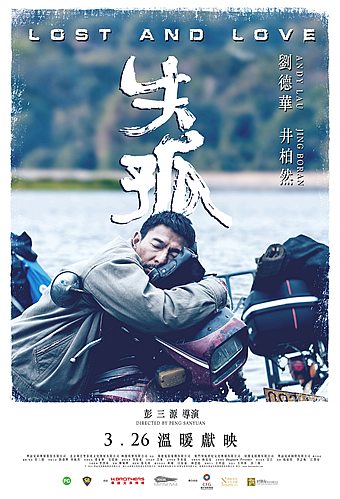
Movie Stills
